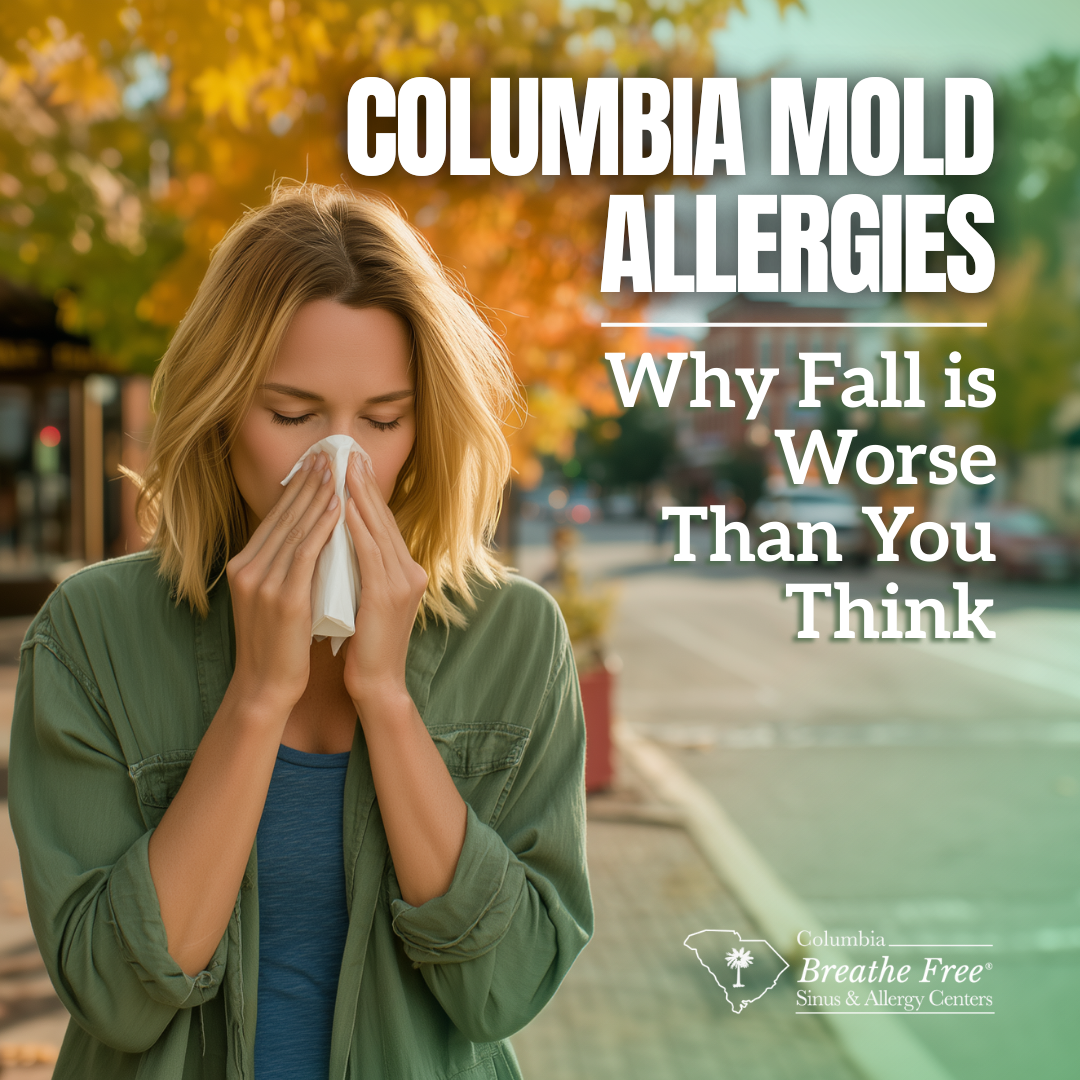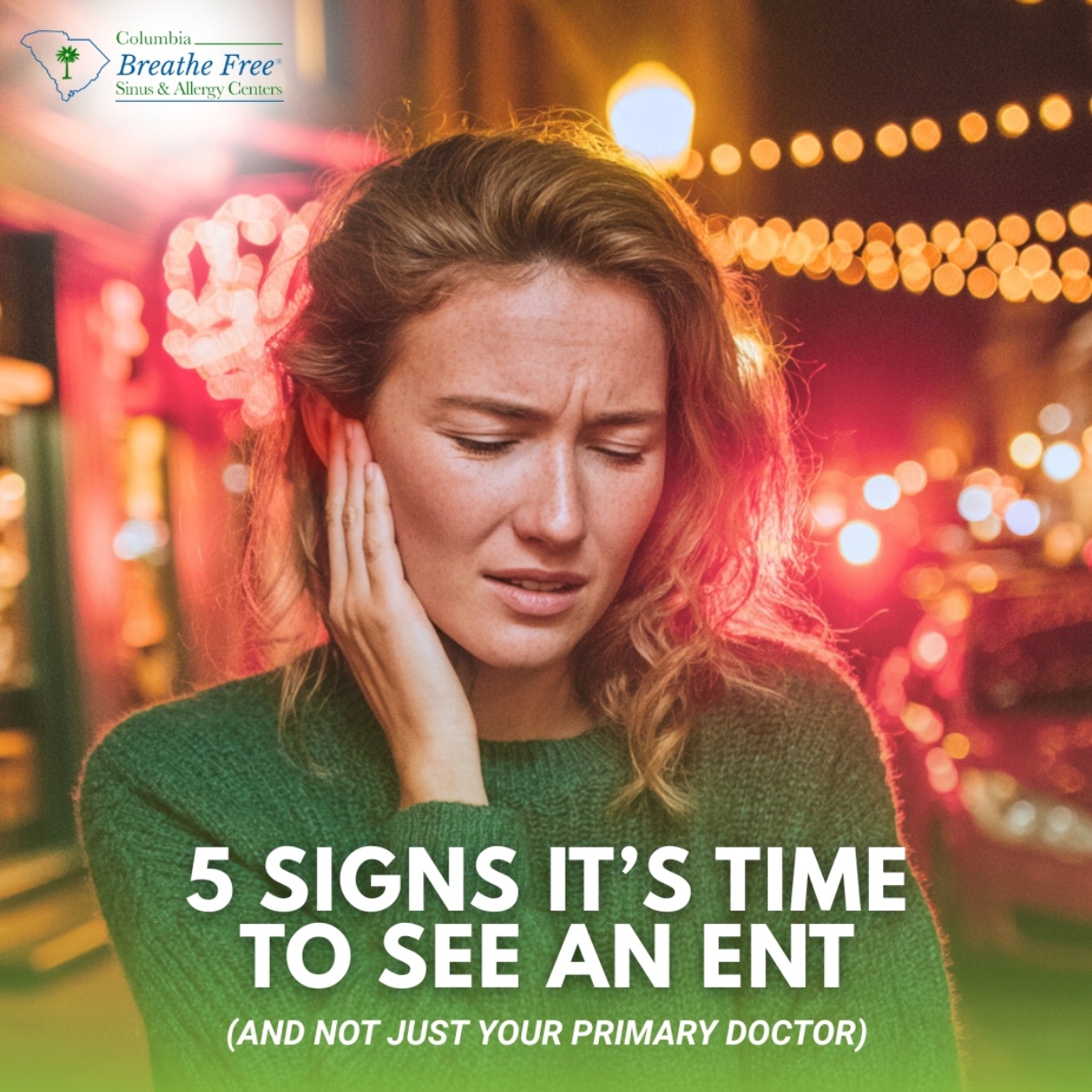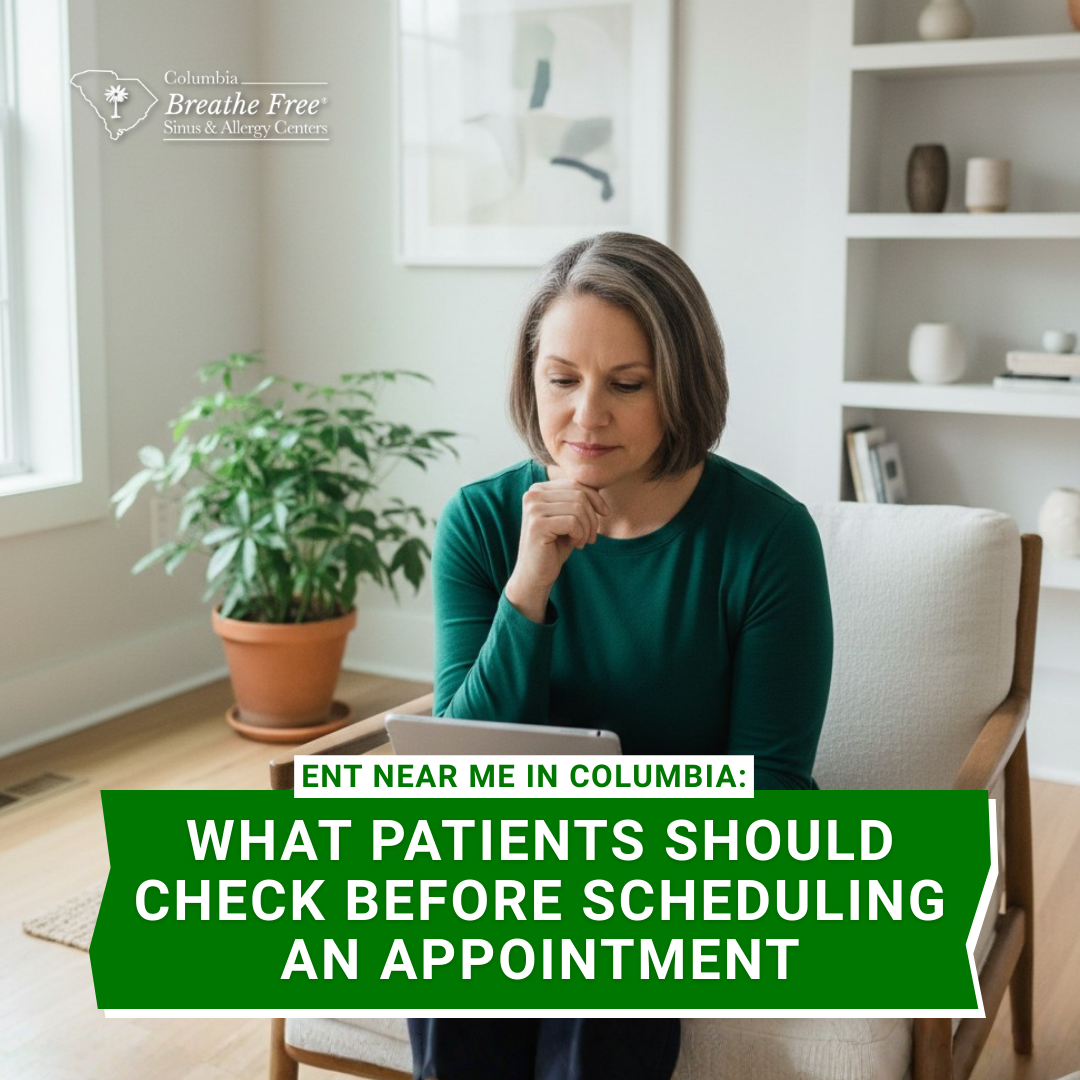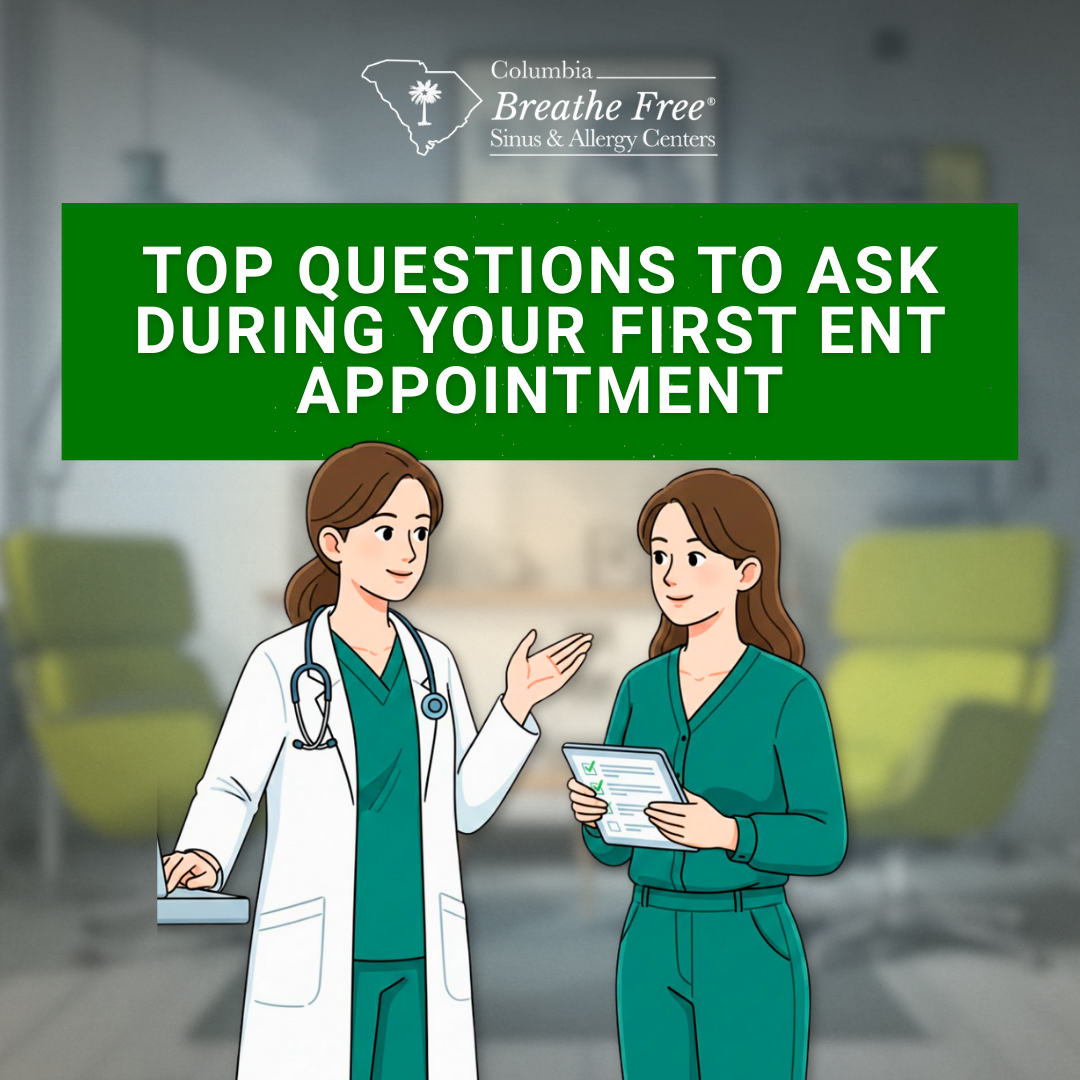.png)
Columbia Mold Allergies: Why Fall is Worse Than You Think
For many people in Columbia, fall means cooler weather, football season, and changing leaves. But it can also bring an unexpected problem—worsening allergy symptoms. If you’ve noticed more congestion, sinus pressure, or headaches this time of year, mold allergies in Columbia SC may be the reason. At Columbia Breathe Free, we help patients understand why fall can trigger sinus trouble and discuss treatment options that may provide relief.

Why Fall Mold Allergies Hit Hard
While spring gets most of the attention for allergy season, fall can be just as difficult—if not worse—for mold allergy sufferers. As leaves fall and pile up, they trap moisture and create the perfect environment for mold growth. When the wind stirs up these spores, they can easily make their way into your nose and sinuses.
In Columbia’s humid climate, these conditions can last well into late fall. Even if you spend most of your time indoors, mold spores can still hitch a ride on clothing, shoes, or pets, triggering allergy symptoms without you realizing it.
How Mold Affects Your Sinuses
Mold spores can irritate the lining of your nose and sinuses, leading to swelling and blocked drainage pathways. This irritation can cause symptoms similar to other seasonal allergies, but it can also contribute to worsening sinus symptoms in some people if not addressed.
Common symptoms include:
- Nasal congestion and runny nose
- Facial pressure or pain, especially around the cheeks and eyes
- Postnasal drip that leads to coughing or sore throat
If these symptoms last for weeks, they could be a sign that mold exposure is contributing to ongoing sinus inflammation.
Reducing Mold Exposure at Home
Even though you can’t control outdoor mold levels, there are steps you can take to limit your exposure indoors. These small changes can help protect your sinuses and reduce the severity of your symptoms during the fall.
- Keep indoor humidity under control: Use a dehumidifier to keep levels between 40–50%, which discourages mold growth.
- Clean regularly: Vacuum with a HEPA filter and wipe down damp areas like bathrooms and kitchens to prevent mold buildup.
- Change clothes after outdoor activities: This helps avoid tracking mold spores into your living space.
Making these habits part of your routine can help you feel better throughout the season.
Outdoor Habits to Help Your Sinuses
Fall activities like raking leaves, hiking, or attending outdoor games can increase your exposure to mold spores. You don’t have to skip them entirely, but taking a few precautions can make a difference.
- Wear a mask when raking or handling leaves: This helps keep spores out of your nose and mouth.
- Shower after spending time outside: Washing away spores from your skin and hair reduces the chance of breathing them in later.
- Check mold counts before outdoor plans: On high-spore days, consider limiting your time outside or wearing protective gear.
These steps may reduce your risk of sinus discomfort and help you enjoy fall in Columbia more comfortably.
When to See an ENT in Columbia
If you’ve tried limiting mold exposure but still have persistent symptoms, it’s time to seek professional help. An ENT in Columbia can evaluate your symptoms, determine if mold is a factor, and recommend treatments like allergy testing, medication, or in-office procedures to improve sinus drainage.
Early intervention can prevent recurring sinus infections and help you breathe more easily—not just in fall, but all year long.
Breathe Easier This Fall with Columbia Breathe Free
Fall in Columbia doesn’t have to mean weeks of congestion, headaches, and sinus pressure. By understanding how mold affects your sinuses and taking steps to reduce exposure, you can protect your health and enjoy the season.
Columbia Breathe Free offers diagnosis and treatment for mold-related sinus problems, helping you explore treatment options that may provide longer-term relief from symptoms. If fall allergies have you feeling worse than you expected, we’re here to help you breathe easier.
Other Blogs

5 Signs It’s Time to See an ENT (and Not Just Your Primary Doctor)
If you’ve ever dealt with persistent ENT issues like chronic nasal congestion, recurring ear infections, severe sinus pain and pressure, and hearing difficulties, then you know how they may affect your daily life, productivity, and comfort, depending on their severity. Many patients today are taking a more proactive approach to their health and may choose to seek care when they notice persistent or worsening symptoms.

ENT Near Me in Columbia: What Patients Should Check Before Scheduling an Appointment
Searching for an “ENT near me” in Columbia often means you’re dealing with ongoing ear, nose, throat, allergy, or sinus concerns. This article explains what ENT providers typically evaluate and how local environmental factors may influence symptoms, along with what to expect during an ENT visit and how treatment options are commonly discussed. It also covers practical considerations before scheduling, including services offered, insurance, accessibility, and appointment availability, and highlights how Columbia Breathe Free helps patients take informed first steps toward understanding and managing persistent ENT, allergy, and sinus symptoms.

Top Questions to Ask During Your First ENT Appointment
A first visit to an ENT specialist can feel overwhelming, especially when dealing with ongoing ear, nose, or throat symptoms. This blog outlines key questions patients may consider asking during their first ENT appointment, including topics related to diagnosis, treatment options, symptom impact, and costs. It also offers practical guidance on how to prepare for an ENT visit and what to expect, helping patients in Columbia, SC make the most of their initial consultation.
The information provided in this article is for informational and educational purposes only and does not constitute medical advice. It is not intended to diagnose, treat, cure, or prevent any disease or medical condition. Always seek the guidance of your physician or other qualified healthcare provider with any questions you may have regarding a medical condition or treatment.
Results may vary: Treatment outcomes and health experiences may differ based on individual medical history, condition severity, and response to care.
Emergency Notice: If you are experiencing a medical emergency, call 911 or seek immediate medical attention.
